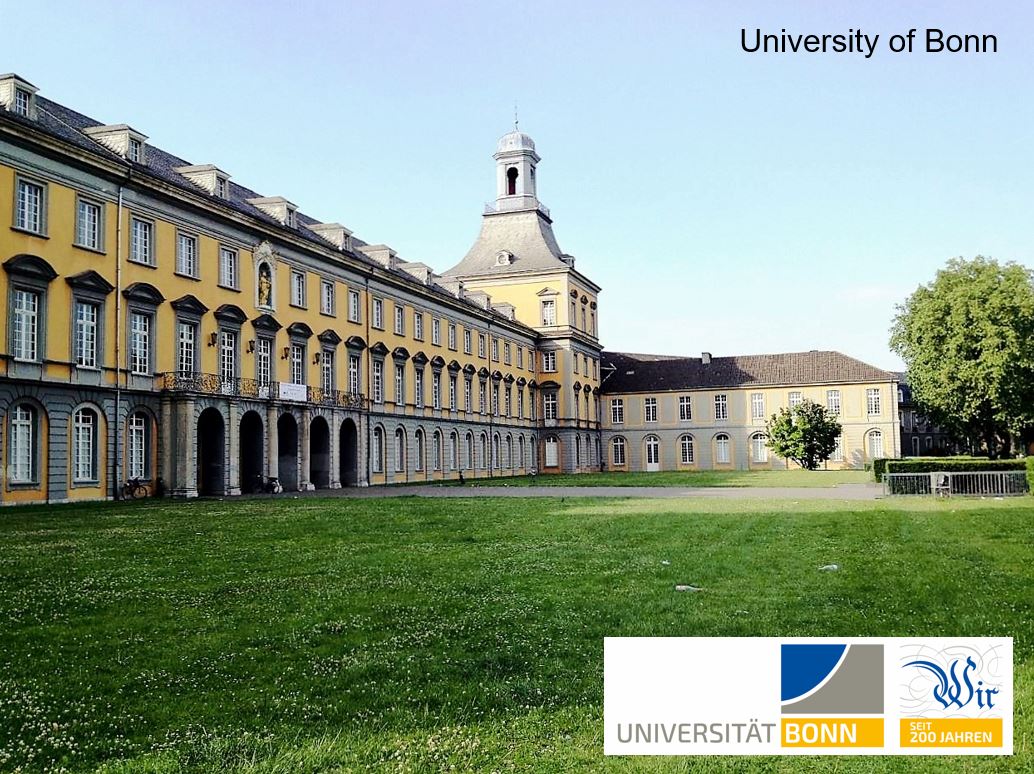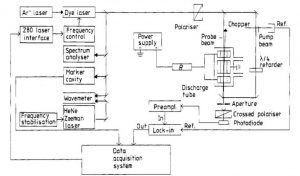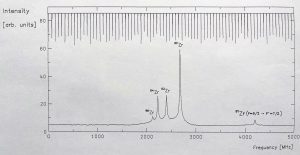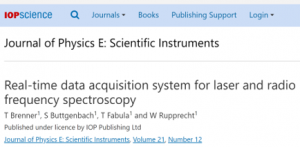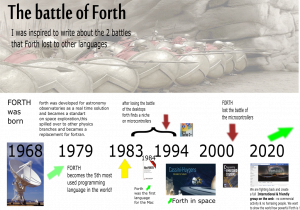Real-time data-acquisition system realized with FORTH
International Forth2020 meetings
“Thanks to SVFIG members and FIGs chapters from all around the world we started this new way of communication in times of quarantine. Covering all the world, from Australia to California present now in 4 continents. Forthers are together for first time, showing what they realized with Forth code or Forth hardware. No matter if you are a novice or you are an experienced Forther who worked on the Enterprise with Captain Kirk !
Show the group what you did, and you will hear applauses, we do not discriminate. We are a Forth supporting group eager to detect new Forth uses, or to make friends with others who love so much this incredible programming language.”
Join the Forth2020 Group and participate with us, each 2nd saturday of the month.
About Forth
“Forth is a stack-based, concatenative language designed by Chuck Moore in the 1960s. Its main features are the use of a stack to hold data, and words that operate on the stack, popping arguments and pushing results. The language itself is small enough that it runs on anything from embedded machines to supercomputers, and expressive enough to build useful programs out of a few hundred words. Successors include Chuck Moore’s own colorForth, as well as the Factor programming language.”
About Forth by Charles H. Moore: Interview from “Masterminds of Programming by Shane Warden, Federico Biancuzzi“
Summary
Within the scope of the diploma thesis a powerful real-time data acquisition system for use in high-frequency and laser spectroscopy was developed.
A two-processor computer system based on an IBM PC-XT compatible personal computer in connection with an ECB–Z80 system was set up, the hardware necessary for computer coupling was developed and a flexible terminal program (TERMINAL) for computer communication was implemented in FORTH, permitting data acquisition rates in the upper kHz-range.
The complete system was tested and checked for its performance by a test measurement of a zirconium (ZrI) spectrum using the method of polarisation spectroscopy, a method of high-resolution laser spectroscopy.
For the interpretation of the measured hyperfine structure (Hfs) spectra a simulation program (SPEKTRUM) was written in Turbo-Pascal, which should help to simplify the assignment of the Hfs components to the lines of the recorded spectrum.
Publication
Published 1988 in the Journal of Physics E: Scientific Instruments:
- Title: “Real-time data acquisition system for laser and radio frequency spectroscopy”
- Authors: Thomas Brenner, Stephanus Büttgenbach, Thomas Fabula and Wolfgang Rupprecht
- DOI: https://iopscience.iop.org/article/10.1088/0022-3735/21/12/005
Abstract
“A low-cost real-time data acquisition system utilising a master (PC-XT) and a slave (Z80) computer for high-resolution atomic spectroscopy is described. The master and the slave computer are linked by a high-speed parallel FIFO buffer permitting data acquisition on a fixed time schedule with 4 mu s time resolution. A modular interface box allows the system to control complex spectroscopic experiments. The use of commercial software packages allows fast and efficient data reduction and analysis on the same computer system. The performance of the system has been demonstrated in polarisation spectroscopy experiment on zirconium.”
Forth online conference
Agenda of the 2nd Forth 2020 zoom meeting, october 10th:
- John Hardy: WebAssembly & Forth
- H.C. Chen: ProEngineer Forth CAD interface
- Bernd Ulmann: “L5” a Forth similar language / analog computers
- Daniel Kalny: Why Forth and why GA-144
- Pablo Reda: Why are there few forth programmers?
- Thomas Fabula: Real-time data-acquisition system realized with Forth
- Ilya Tarasov: Build your Forth CPU “SUN” on FPGA
- Don Golding (SVFIG): Forth Robots / Space exploration with Forth
- Bill Ragsdale (SVFIG): A Tiny, Clever calculation for PI
Forth2020 is a team work
The battle of FORTH by Peter Minuth:
Video
For more information visit the Forth2020 Youtube-Channel:
Further information
- german: Forth-Gesellschaft e.V. forth-ev.de
- international: Forth @ Wikipedia
GitHub repositories
- github.com/ThomasFabula/Forth_Z80
- github.com/ThomasFabula/Diploma_Physics
- github.com/ThomasFabula/ZIRKON
References


